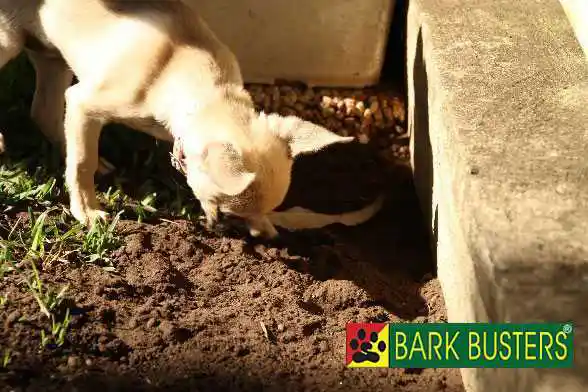The Chihuahua may be small in stature but is LARGE in personality. Although considered the world's smallest dog, its outgoing, adventurous, and loyal personality makes it one of the most loved toy dogs. Nicknamed "Chis", this breed has grown to be the fourth largest in popularity worldwide. Bark Buster trainers are often called upon to deal with this breed's yapping and tendency to be aggressive if not trained or socialised properly.
The Chihuahua
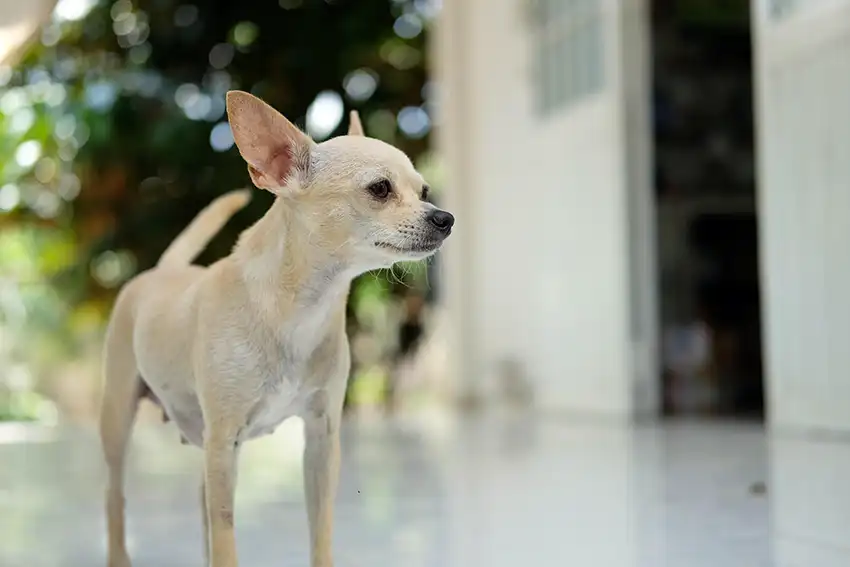
Why is this breed so popular among toy dog lovers? Its extreme devotion to its owner, its look of vulnerability and love of affection make it a great companion dog.
If you decide a Chihuahua is your breed, be prepared to have your dog follow you around wherever you go. Going shopping? Better put him in your bag as you roam around the supermarket. Want to make dinner? Be prepared to have a mini chef at your feet. Going to sleep? Chihuahuas will burrow themselves under the covers right next to you as fast as they burrow into your heart.
Chihuahuas have one of the longest life spans compared to other breeds. If you adopt a Chihuahua, you can expect it to live until at least 15 years. In fact, the oldest Chihuahua ever, lived a full 20 years, 265 days old, and was named "Megabyte". Another reason people love this breed stems from their wide range of colours with blue, brown, chocolate, white and black being the most common.
With any toy breed, we need to be careful because they can be injured by stepping on them or jumping out of your arms. Never leave them unattended in your backyard because if there is a tiny hole in your fence, they'll find a way to squeeze through. As bold explorers, they can fit in places other puppies or dogs can't fit.
Birds of prey have been known to swoop down and capture this breed, so keep them safe.
History
The Chihuahua's history is complicated and sketchy at best. There are many thoughts and theories in relation to the origin of the breed. Archeologic diggings have unearthed what seems to suggest that the breed originated in Mexico. The most common and most likely theory is that Chihuahuas are descended from the Techichi, a companion dog favoured by the Toltec civilization in Mexico and the smaller hairless dog brought from Asia to North America via Alaska.
There are no records of the Techichi available before the 9th century, although artifacts dating back to 300 BC have been located, buried as part of the western Mexico shaft tomb tradition. Which are thought to depict a society that buried their pets along with their owners.
There is also some proof that the Chihuahua's were used as living hot water bottles. Anyone who lives with a Chihuahua will understand why that is more than likely a fact.
In the USA, the breed's popularity exploded when Taco Bell chose "Gidget", a female Chihuahua, as its mascot. Movies like "Beverly Hills Chihuahua" and "Legally Blonde" have made them more popular than ever.
Management
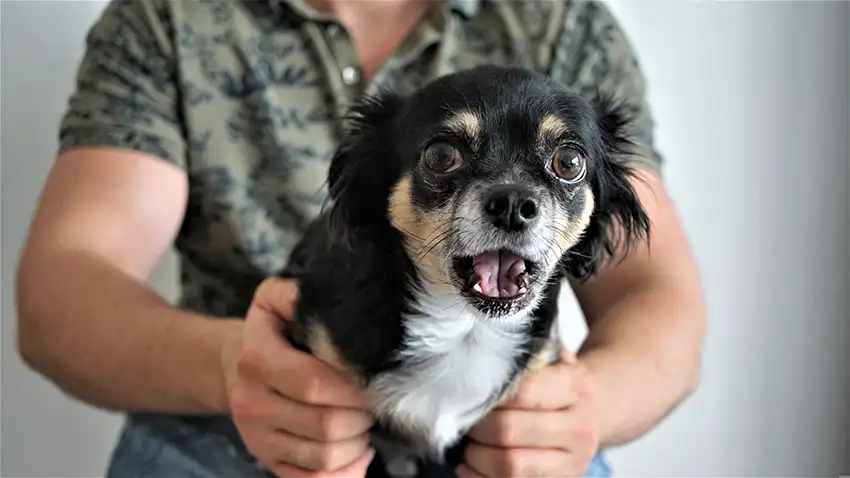
Dog owners beware because if you pamper your Chihuahua too much, they can become aggressive and bark incessantly at both people and other animals. Without proper training, this breed can become very demanding. They don't respond well to negative reinforcement. Instead, establishing yourself as a strong leader right from the start will help to prevent many behaviour problems.
If you don't want endless yapping or biting and aggressive behaviours, start training and socialisation early. You've may have heard the phrase "dynamite comes in small packages", well this describes the Chihuahua. Their natural distrust of strangers can create an unpleasant temperament if not stopped early on.
Also, too often they don't know how small they are and will take on a breed twice their size. Fast learners, Chihuahua's can compete in obedience and agility trials with the same finesse as much larger breeds.
They can be hard to house train, so it is best to follow the Bark Busters toilet training tips. They do not like the cold or rain, so getting them to toilet outdoors in bad weather can be a bit of challenge.
Personality and Temperament
It is the Chihuahua's feisty nature that usually gets them in trouble. Chihuahuas never back down from a fight, even when encountering a larger, aggressive dog. Therefore, you need someone who can train this dog correctly, finding a happy medium between being a good watch dog yet not being aggressive. This breed will run your life if you let them. You will need to show strong "leadership" and you will need to establish the rules and boundaries or they will take over.
As this breed is so tiny and somewhat fragile, you need to be extremely careful with a Chihuahua around younger children. It is very important that you don't leave young children alone with your Chihuahua because they could be easily snapped at, nipped, or bitten. Also, toddlers can play rough thinking this dog is like a doll. Chihuahuas can easily be injured with rough play.
Chihuahuas make ideal companions for people who live in apartments or don't have a large garden or yard. However, if you don't curb their natural tendency to bark, with the right training at the onset, your neighbours may complain.
Chihuahuas are not tolerant of cold weather and would prefer to be in the warm indoors, snuggled under a warm blanket. Cold and Chihuahuas don't really mix which is often why you see them bundled up in sweaters.
Socialisation at a young age is extremely important for these dogs. Try to expose them to different people, sights, smells, and experiences so that you have a well-rounded and happy dog. However, try to make all the interactions a positive experience.
The Right Training For Your Chihuahua

This breed needs gentle and consistent training to control any aggression, nipping or barking as well as any tendency they have towards fighting with other dogs.
The Chihuahua is generally not the most social dog with others outside their family and rarely with other dogs, unless they have accepted them into the family. Therefore, training is required in many cases though it does not need to be regimented, it does need to be consistent and focused on the issues your dog has.
Our methods are very compatible with this breed as we don't rely on treats to train, we use communication. The Chihuahua is a very finicky eater, and they can ignore treats as being any incentive to do anything.
Always start any training with your dog slowly, gradually, and try not to pick up your dog to control its behaviour. This can make them more determined to still do the bad behaviour, but it will try to avoid your hands and run away.
The Chihuahua has been known to jump straight out of their dog owner's hands to get to someone entering the home, seriously injuring itself as a result.
Many doggie-parents might think that training is unnecessary or pointless, but that would be akin to not seeking some form of education for your children. The facts are you owe it to your dog to educate it if you can, or to seek professional help if you can't. Your dog would have received ongoing 'canine education' if it had remained with its mother and litter mates. Now, as pet parents, we all have a responsibility to complete our dog's education.
Capabilities
Although we often hear about Labradors or German Shepherds being service dogs, don’t rule out the Chihuahua who is quite capable as well. Chihuahuas are intelligent and can be trained when it is done with a gentleness, patience, and kindness.
Their large, round eyes are expressive and their single-minded determination makes them good at a variety of activities when they put their mind to it.
Socialisation
By Ruth Marquardt, Bark Busters Trainer
The Chihuahua can conjure up images of a sweet little dog cuddled up with its owner, or a snarling little “ankle biter”, depending on who you ask. Why are some Chihuahuas perfectly well-behaved, and others seem to hate everyone but their owners? The answer lies in two areas: socialisation and training.
Carly was a great dog and she fit right in, sleeping at the foot of their bed each night, and sitting on their laps every chance she got. She was like their child, and they treated her just like their child, looking to give her everything her heart desired.
Chihuahuas, as with other dogs, need to be well-socialised, and the best time to do that is when they are puppies. When a puppy is born, they have no preconceived idea of whether people are good or bad. A puppy must be socialised by taking it into public, often when it is young. They must have many positive experiences early on to view people as a positive influence.
She would then greet them wildly on their return, as if they had been gone for weeks. Apart from that, their lives together were fun, and Carly was always just one step behind them, asleep on their lap or asleep in their bed. She was so loving, and they saw no reason not to give her everything she wanted.
There is also a misconception that small dogs don't have to be trained. I tell my clients all the time that if they are relying on picking up their dogs to control them, then they have no control. Sit on the floor or on a low chair often with your Chihuahua.
Height gives a dog an advantage. You may have owned a dog, or know someone who has owned a dog, that runs to the top of the stairs, barking down at what it feels is a threat. This is the dog gaining height to gain the advantage over the perceived threat. So, if you are lower to the ground, you are less threatening. Call him with a fun voice! If they think that there is something good that will happen, they will be much more likely to come to you. Always use lots and lots of praise when they listen!
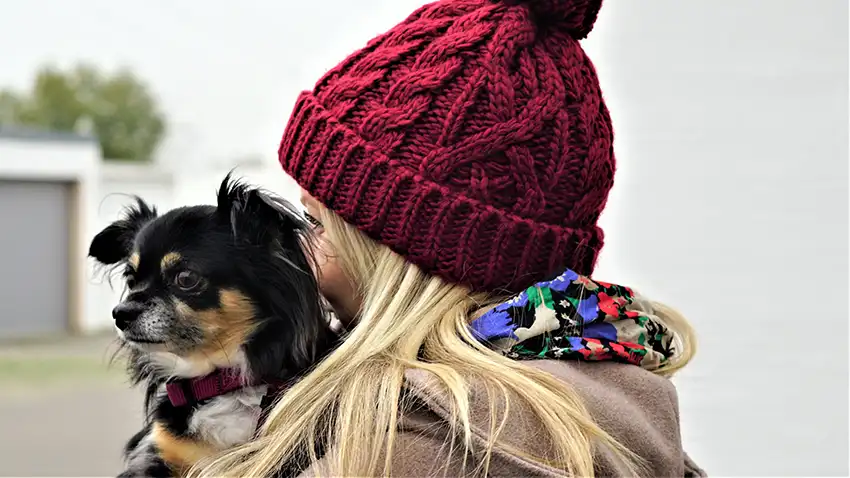
Picking up small dogs when they are doing something wrong, really gives him the wrong idea. Even sitting on your lap, so they should only jump up onto your lap if you invite him first. Otherwise, you may find your Chihuahua growling at other dogs or even your children when they are on your lap. If you can get your dog to come to you every time, then you will not need to pick them up to control them; just to love them.
Sarah and James were confused as to why Carly had suddenly gone from being so good, to being so bad at around 12 months of age.
This 12-month milestone in dogs usually coincides with reaching maturity. They are hitting that age of maturity, full grown, where they are now ready to push the boundaries and to work out where they fit in the family unit, their position in the household, and what they can get away with, if you like. What they decide depends on how we behave and what we tell them via our actions and behaviour.
Often, I find small dogs are afraid to be picked up and will run away from the owner. This is usually a case of the owner overhandling their dog, such as picking them up to put them someplace where they don't want to go, or even handing them to someone they don't know. Dogs need to know their owners will keep them safe, and handing the dog to a perfect stranger to get them over his fear will only make them afraid of being handled. First, they need know their owner will keep them safe, and then they will learn they don't have to worry about strangers, because the owner will make the decision for them.
The reason Carly took so long to get to that point was due to her lack of maturity. Until 12 months, she was not ready to act to push the boundaries until she reached the maturity needed to hold what she gains.
We all love our dogs, but I do ask my clients to remember that their Chihuahua is a dog, not a child in a fur suit. We need to educate our dogs in a way that is easy for them to understand. They learn by association, so if they get a positive reaction from you, they will likely repeat that action. A negative reaction from you and they will likely avoid that behaviour. Teach your dog to follow you and come to you when called, and you will be on the right path to a well-behaved dog, one that everyone can enjoy!
Health
Everyday Illnesses and Injuries
Your Chihuahua’s health concerns will change over the course of their life. A puppy might be more prone to eat something they shouldn’t, a 2-year-old Chihuahua may show signs of dental disease, and a senior Chihuahua may be more likely to develop a heart condition as they age. Chihuahuas also have personality and physical traits that may make them more prone to certain conditions, and as a small, active breed, Chihuahuas tend to be more prone to fractures.
If you are ever concerned about your dog’s health, your local veterinarian is a great resource—no matter how small the question.
Genetic Health Concerns
Like many popular breeds, the Chihuahua has its fair share of hereditary based issues, like bone and joint problems. Most reputable breeders now have their breeding stock checked and scored for these hereditary ailments by a vet. You can request proof that the puppy you are purchasing comes from parents that have been checked for these issues.
Many other health issues are also hereditary, so do some research on the ancestry of your puppy and any health issues of that particular breed.
Many rescue organisations also check for common ailments before making them available for adoption.
Preparing Yourself
As a pet owner, you should expect to pay for basic veterinary care like vaccines, spay / neuter, and annual checkups. Many pet owners don’t consider the unexpected illnesses and injuries that can occur throughout a pet's life, and they don't prepare for them. Medical insurance can help a pet owner prepare.
The concept of medical insurance for pets is straightforward. You pay a monthly premium to be covered for eligible veterinary expenses. However, every provider is different, offering varied coverage with different plans, pricing options and limitations. As you research, pay close attention to what is covered, are pre-existing conditions excluded, what are the deductible options, and ease of use.
Training your Chihuahua
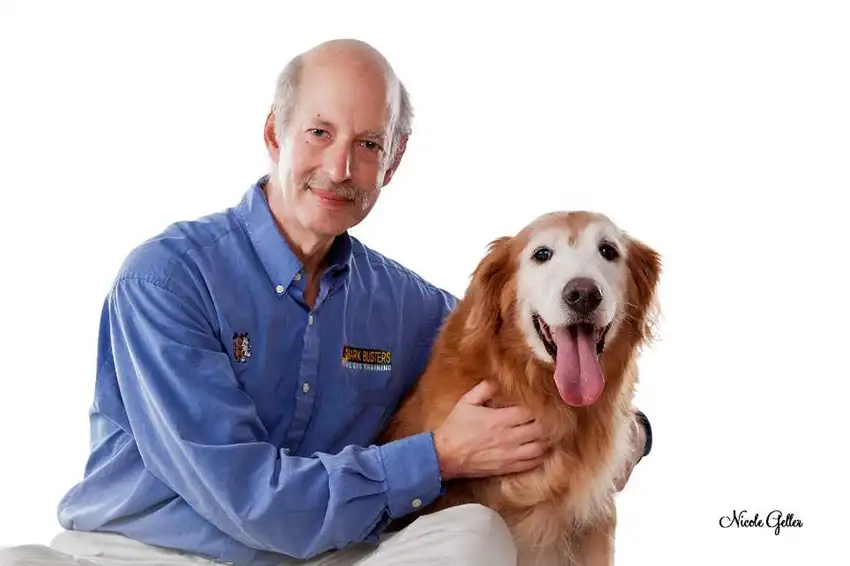
Bark Busters USA National Trainer - Jeff Drier on Chihuahuas
These tiny dogs have personality and are experts at getting their own way. They often do it by being very sweet and loving, jumping onto their owner's laps, and snuggling in for hours at a time.
Multiple Dog Households
I vividly remember a very nice lady we worked with who had five Chihuahuas. To her they were like potato chips, she couldn't have just one. She called us because she couldn't have a cup of coffee or read her newspaper without the dogs being all over her. She loved them and snuggling and cuddling with them but at times she wanted to be left alone to enjoy her morning coffee or sit in her sunroom and read.
We spent a little time getting to know her and her dogs and watched as they continuously demanded and received her attention. Her biggest problem was that her dogs didn't see her as a leader and didn't respect her space.
Chihuahuas are very clever at getting their own way
One of them had her completely fooled. While four of the five would readily jump up on the sofa and then start climbing on her, one of them, who was a little on the plump side, would put her paws on the lady's legs and make a little crying sound. The woman would then reach down and lift the dog into her lap, giving her the most desirable seat in the house.
We watched this happen a couple of times and then I explained that she was being played and the dog could easily jump up on her own. She didn't believe me, so I asked if she'd like me to prove it. She agreed and I asked her to give me one of the dog's favourite treats, which she did.
We got all the dogs into the next room and then I put the treat on the sofa. I let only that one dog into the room and within a matter of seconds, the dog was up on the sofa eating the treat. The woman laughed and said, "well, that little trickster has been playing me for two years".
We helped her understand how her behaviour affected her dogs' behaviour and how to begin changing the dynamics. By the time we left she was able to sit on her sofa, drink her coffee and read her paper without her dogs demanding her attention. She said it was the first time in years she had her coffee while sitting down. She was now able to both enjoy her dogs and enjoy time without them demanding to be on her lap.
The Right Socialisation for Your Chihuahua
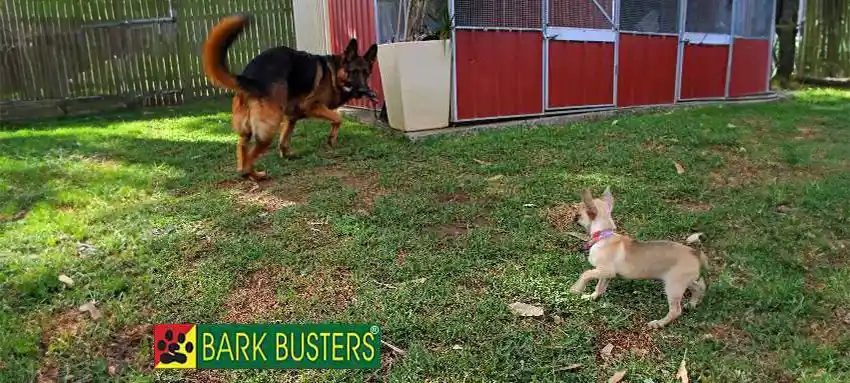
Your Chihuahua will cope better if you start their introduction to other dogs by selecting calm and gentle dogs or match prospective play mates to their size or energy levels.
Match play mates the same way you would match friends for your child, with a view to their gentleness, their energy level, or their size, whether they will teach them bad habits or hurt them.
Think of your close friend's dogs that you know to be gentle and safe. Also consider if they might teach them to bark or might they pose a threat to an inexperienced young dog. Dog parks are not the right place to commence your dog's socialisation.
Remember: Dogs cope better with scary situations if they are mature and have some life experiences. If you feel you need to take your dog to a dog park, then leaving it until they are 12 months of age is advised.
Some Training Exercises to Try
One easy way to start is try walking from room to room, or throughout your home and make sure you always lead the way through all doors as well as up and down the stairs. This is a great way of getting your dog to listen to you and respect your commands. We educate our children to not barge through doorways ahead of us, to not run up and down the stairs whilst we are going up or down them, or barge through the front door onto a busy road. Our dogs shouldn't be allowed to do this too.
Dogs instinctively know that a good leader takes control, and they are hard-wired to follow the one who is fit to lead. It must be you, if you want to make sure that your dog listens to you and respects what you say.
If your dog rushes through the door before you, then just turn around and go the other way immediately. Your dog will more than likely try once again to get ahead of you, but don't give up.
Once your little charge starts to drop in beside you or drops behind, praise with just a high-pitched tone. Once you gain the ability to have your dog stop rushing ahead of you praise lavishly and go to the treat cupboard, you have done enough for the day.
Just remember to always do this every time you start to walk around your home or go for a walk.
Remember: In the dog's eyes, a good leader always leads, and this is a gentle and passive exercise to establish your leadership.
Common Behaviour Problems
Due to their tiny size, parents of Chihuahuas can sometimes cope with their dog's bad behaviour and generally only seek help from Bark Busters when their patience runs out on managing their behaviour or they receive complaints from their neighbours.
Others call us as soon as they get their puppy home, as they want to prevent any bad behaviour from starting.
Most new puppy parents request help with toilet training, barking and separation anxiety.
Puppy Selection
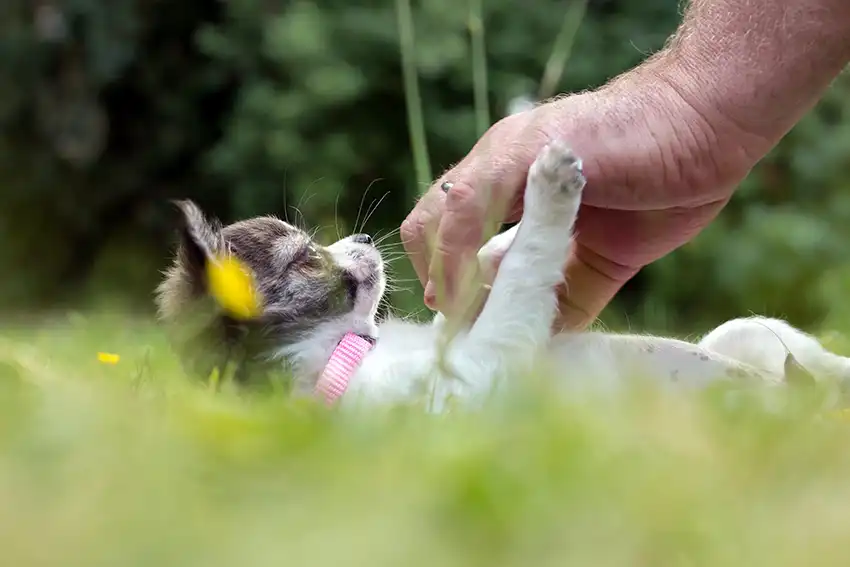
There are many places to acquire a puppy where you can be sure you are getting a puppy that has had the proper breeding. Also, check out your local rescues and shelters because they have some amazing dogs and puppies that are desperate for a forever home.
Check out the local breed specific rescues, animal welfare shelters, RSPCA and Dogs Trust, as they have many great dogs looking for homes too, who through no fault of their own, have ended up being abandoned. These organisations test their dogs for temperament and soundness.
By adopting, you will be helping a dog in need, one that wants nothing more than to be in a loving home. There are too many companion animals euthanised each year and Bark Busters encourages you to visit one first before buying a puppy from a breeder.
When you are selecting a puppy, try to avoid selecting the fearful or over-zealous puppy. If you are at a shelter, consider that the dog might just be traumatised by their surroundings. All those barking dogs cause timid dogs stress and quite often you will see a different dog if you can get the staff to bring him away to a private viewing section for you. Animal Welfare and Rescues do amazing work in trying to save dogs and match breeds to the right owners, so consider that option when looking for a new puppy.
Select the right puppy. One that suits your lifestyle.
Many of our Bark Busters’ trainers volunteer their services at local shelters and rescues to assist in rehabilitating dogs. Bark Busters have saved many thousands of dogs through our volunteer rescue programmes around the world.
If you do decide to go to a breeder, then ensure you view both parents to determine the puppy’s personality and parentage.
View all interaction between the puppies as this will tell you a lot about their personality. Look out for those assertive types if you want a dog that is going to be good family dog that is good with children.
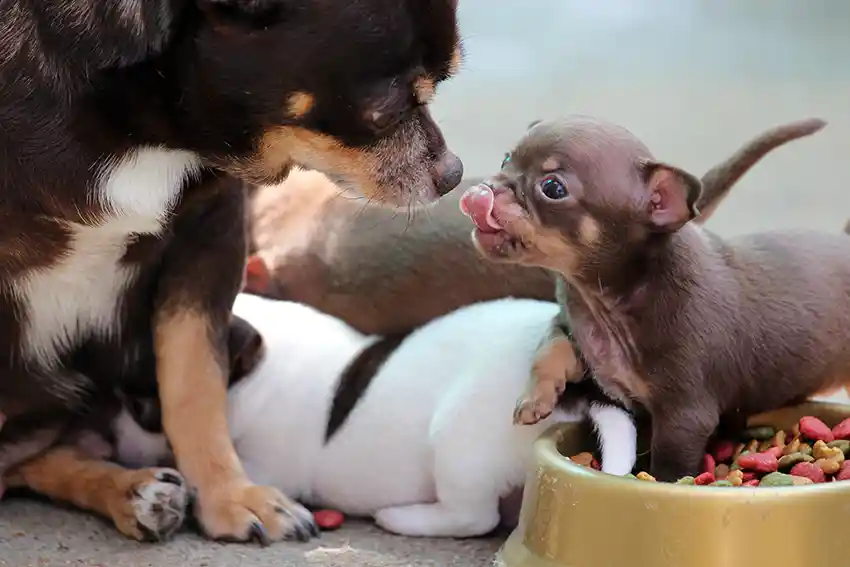
Tips for Bringing a New Puppy Home
Do not bring a puppy home before it has reached 8 weeks of age, but preferably 12 weeks. Any earlier and they will miss out on much needed bonding with other puppies and their mother.
Bring your puppy home early in the day to allow time for your puppy to settle into its new home.
Try to bring some bedding home with the scent of the mother dog, scent of other litter mates, or a familiar scent.
Ensure that you know where your puppy will sleep and introduce your puppy to this area during mealtimes.
If you need to leave your puppy alone for a short while, ensure that you address any barking, while hidden close by, without returning to the puppy. Returning every time your puppy demands, will only encourage more barking. Puppies do better if they know you are there nearby and have not deserted them.
Ensure you have the same diet that your puppy was being fed when with its mother. Any diet change must be a gradual one.
Ensure that you puppy proof your house and place anything dangerous out of harm's way, such as electrical cables and poisonous chemicals.
Make sure you provide lots of bathroom breaks. Take your puppy to do its business at least 8 times per day, after sleeping, eating, drinking and any exuberant exercise.
Do I Want One Dog or Two?
We are often asked by prospective dog parents if they should get one or two puppies. We always answer the same way. Get two only if you really want two dogs!
Dogs are pack animals, and they love having company, but the selection of two dogs is something that must be carefully thought through.
Two neutered males can cohabit without too many issues if their doggie parents treat them equally and do not display any favouritism. Unequal treatment is usually behind most Sibling Rivalry cases.
A male and a female of equal energy can also cohabit. This can be the best match, providing that the female and male are equally matched in size. If they are differing sizes, its best that the male is the larger of the two. Make sure that the female is neutered, when appropriate, or problems could occur if a large male tries to mate with a smaller female.
Two females are not always the perfect pair, as females invariably want to rule the household. It won’t be long before they test each other, and some females won't back down. When you have two females in a household, they both might try to be the boss of each other, which can lead to fights.
Toilet Training
Without a doubt, toilet training a puppy has its challenges and can try your patience. You need to be observant and begin as soon as the puppy is home with you. Bark Busters will make sure the process is not stressful for you or your puppy.
When puppies are first born, they relieve themselves in their den, but their mother is there to clean them. Therefore, there is no scent of urine or faeces where the puppies eat, sleep and play. As they get slightly older, they learn to imitate the mother when she goes outside. This way the puppy becomes conditioned to never eliminate in their dens. If you are crate training, you will find that puppies will avoid toileting in their crate at all costs.
Knowing when your puppy is likely to relieve themselves by reading their body language is the key to success.
Have you ever taken a puppy outside for a walk only to find they relieve themselves as soon as they get back indoors? To avoid this, walk the puppy directly to the area you have designated the toileting area. Stand still and stay with the puppy, so they no longer show interest in you. Do not sit down as this will only encourage the puppy to jump on you and forget what they are there for. Praise when they perform. NEVER scold or rub their nose in any mistakes. This is cruel and will teach your puppy to move out of sight or wait until you are not watching.
Your puppy does not possess human logic but will begin to form good habits through structured routines. Positive reinforcement when they do the right thing in the right place is the best and quickest toilet training method.
Four Basic Needs
Let's examine those four basic needs and why your dog needs them to keep it healthy, balanced and content.
Food - diet / nutrition
Chihuahuas can be pretty picky about their food. Consult with your veterinarian about which brand of food you should purchase, or which raw diet is best for your dog. Your dog's diet is important to meet his nutritional needs and to maintain his overall health. As they are so small, you don't need a lot of food to fill them up!
We promote a diet that is grain free, low in carbohydrates and without any harmful e-numbers, colours and preservatives. Carbohydrates do add energy that the dog needs to burn off and can make an already hyperactive dog more active.
The right diet, grain free and filled with fruits, vegetables and raw meat will have advantages to how your dog will feel, look and act.
If you want to understand why grains can make a dog more energetic, you only need to think of racehorses and how their trainers give them grain to get highly energetic racehorses. Energy in, equals energy out.
Bark Busters dog trainers are not vets or dietitians, so we urge you to do your own research into the best diet for your dog. A diet that you will be comfortable with.
We do however have vast experience of how highly concentrated grain diets effect behaviour and can cause hyperactivity. This is very prominent in Japan, where most dogs are fed high levels of rice in their diet which can adversely affect concentration and focus.
Safety - through leadership and education
All dogs need strong leadership and to know where they fit into the family unit. If they know they have a leader that will make all the decisions, one who is fair and just, they will be happy and content.
On the other hand, if they have no structure in their life, they have inconsistency, and don’t know how things will be from one day to the next, then they will become stressed and may experience health ailments, skin and stomach issues and behaviour problems. Routine and respect must be established. With equal doses of love and structure your dog will feel safe and secure.
Your dog just wants to please you but many times he doesn't know how. If you don't quickly establish yourself as the leader, a Chihuahua will gladly assume this role and chaos will follow.
Shelter - a place to call their own
Dogs love nothing better than to curl up on the couch or in a place they can call their own, even when there is more than one dog. Most dogs are very sociable, and they will think nothing of all snuggling in together. Provide your dog with its own "den", a place where they can call home, and somewhere they can go to for a bit of peace and quiet. Just make sure their "den" is warm, easy to clean and maintain. Also, this breed does not like to be cold, and their shivering is a sign that some warmth is needed.
Entertainment - toys & games
A very important part of your dog's four basic needs is their need to have something to do. If we want to avoid our pets becoming bored and destructive, then they need a way to fill their day.
Dogs thrive with physical and mental exercise. Dogs are highly intelligent animals, and they need to keep their brains active as much as their bodies. Entertainment is an important part of their well-being and essential to your dog's overall mental health.
One great toy is the Bark Busters GameChanger® which helps to prevent boredom, stress, and separation anxiety. By filling it with small treats, your dog will have plenty of fun trying to get the treats to dispense.
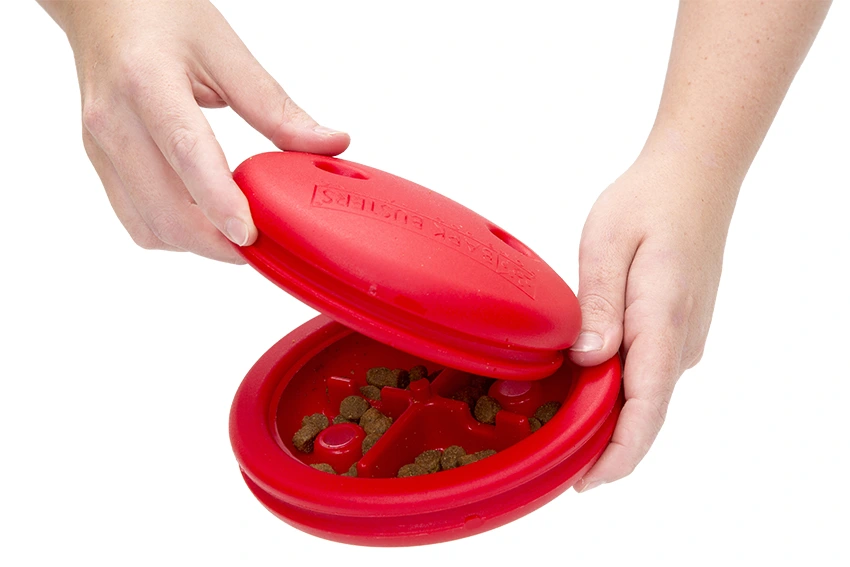
Games to Play

Chihuahuas can be very hyper, and they love to play. Although you might be tempted to carry your Chihuahua around, they need to walk. It doesn't take much exercise to wear a Chihuahua out, but they need an outlet for all their pent-up energy both mentally and physically.
"Hide the Treat" is a great game to play since dogs have such great noses. Start by showing your dog the treat and then you, or have someone else, hide it. Start by showing your dog where you have hidden the treat and when they master this you can then move on to not showing your dog where it is hidden. Increase the distance away from the dog that the treat is hidden once they catch on.
Hide treats, or their favourite toys, and see if they can find them. You can even try hiding yourself! Remember to give your dog a lot of praise when they find the missing item by saying "good boy" or "good girl", in a high-pitched voice, with a gentle praise.
The Three Cup Game can help to ward off boredom. You will need three cups and a small ball. Place the three cups upside down on the floor, show your dog the ball and then hide it under one of the cups. Mix up the arrangement of your cups and see if you can get the dog to point to the right cup where the ball is.
As they are so small, you will have to scale down on the size of their toys. The toys can be as simple as a ball or bubbles or a little more sophisticated like the interactive toy like the GameChanger®.
Children and Your Chihuahua
Kids love this breed as they are easy for them to love and pick up, but you need to make sure that you always monitor their interaction. They are a very delicate breed and can easily become concerned about any rough treatment.
Encourage your children to play and interact in a sensible way, where they don't encourage biting or barking.
Why not try the hide and seek games where the child can hide and treat the dog with some food when they find them.
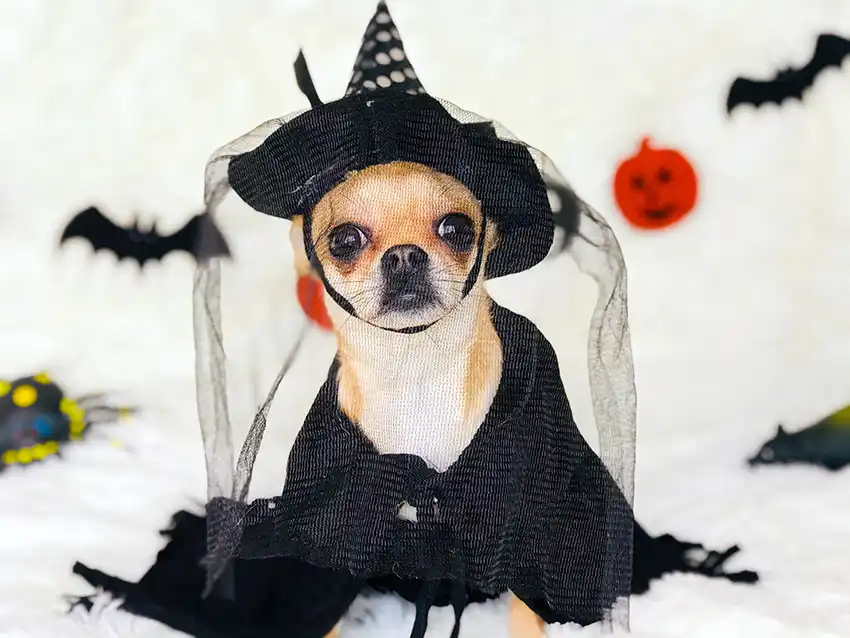
Allowing children to dress a dog up where the dog absolutely hates this, is not wise.
Never leave any dogs and children alone. Despite their size they can hurt children and kids can unwittingly hurt them too.
Interactive Play
Bark Busters has the ultimate toy for all dogs that provides dogs with several options. The GameChanger® by Bark Busters is an interactive puzzle toy that delivers a treat. It's a chew toy, that they can carry around and take to their bed. They can't rip it apart like many other toys. It's a workout toy, that they flip over with their nose and scratch it with their paws. The GameChanger® comes in four vibrant colours and will give your dog lots of fun and mental stimulation.
Bark Busters Lifetime Support Guarantee
Bark Busters dog behaviour therapists and trainers have trained more than 1 Million dogs worldwide and are renowned authorities in addressing dog behaviour with all-natural, dog-friendly methods. The Bark Busters training is the only service of its kind to provide International dog training guaranteed lifetime support. With hundreds of trainers around the world, Bark Busters continues its mission to enhance the human/canine relationship and to reduce the possibility of maltreatment, abandonment and euthanasia. Contact your local Bark Busters dog trainer to see how they can help.
This article is the copyright of Bark Busters® and is intended for information purposes only. Dog owners should fully research any problems that they may have with their dogs.

